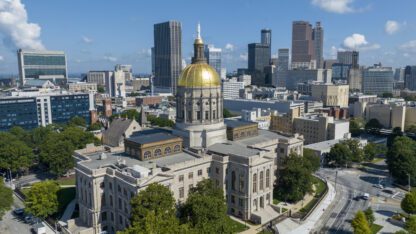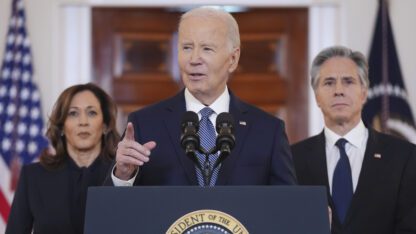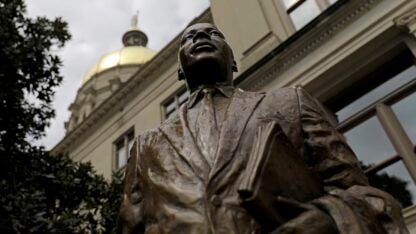Ted Metz may not get many votes in the Georgia governor’s race, but the Libertarian candidate is on the ballot, raising the possibility that no one else will get to declare victory on Election Day either.
Republican Brian Kemp and Democrat Stacey Abrams are in the home stretch of a closely watched race to succeed term-limited GOP Gov. Nathan Deal, and polls have consistently shown the rivals running neck and neck.
Metz’s third-party campaign has attracted scant attention, but he could still play a defining role in Tuesday’s outcome. If the vote margin between Kemp and Abrams is close enough, even a small percentage of votes for Metz could force the two major party contenders into a month of overtime culminating in a runoff election Dec. 4.
That’s because Georgia requires candidates to get more than 50 percent of the vote to win an election.
“The reason why you have to take it seriously is we expect the margin is going to be so close between Kemp and Abrams,” said Andra Gillespie, a political science professor at Emory University in Atlanta. “It’s probably going to be the closest we’ve seen in a long while.”
Libertarians have been on the ballot for every Georgia governor’s election since 1998, taking between 2 and 4 percent of the vote, but no fall governor’s race has ever required a runoff.
Runoffs in other statewide races have been rare, too. The last was in 2008, when Republican Sen. Saxby Chambliss barely missed a November victory with 49.8 percent of the vote. Libertarian Allen Buckley received 3.4 percent. Chambliss easily won re-election in the December runoff.
Metz, 60, is a retired insurance agent and financial planner whose campaign largely has revolved around promoting industrial hemp. During a recent televised debate, he urged voters to help him deny Kemp or Abrams and outright victory on Election Day.
“This is going to be a runoff, anyway,” Metz said. “If you’re tired of the two-party system and the two-party tyranny of the oligarchs running the planet, then a vote for me is a protest vote to show them that you’re sick and tired of the same old stuff.”
Both parties are sending their highest-ranking motivators to Georgia in the campaign’s final days. President Donald Trump will hold a rally Sunday with Kemp, who’s also lined up a three-city tour Thursday with Vice President Mike Pence. Former President Barack Obama will visit Atlanta on Friday to fire up Democrats for Abrams.
“The fact they’re all coming here shows that both sides see this as very much up for grabs,” said Charles Bullock, a political science professor at the University of Georgia.
The stark contrast between the two major party candidates in Georgia could dampen voters’ temptation to cast third-party protest votes. Abrams hopes to become the first black woman elected a U.S. governor and has run as an unabashed liberal. Kemp comes from the GOP’s conservative wing and has embraced Trump’s support.
A runoff would bring fresh challenges for each. Republicans have historically fared better in Georgia runoffs, Bullock said, and Abrams’ strategy of mobilizing first-time and less-frequent voters could struggle to maintain momentum into December.
Meanwhile, Deal has called the state legislature into a special session Nov. 13 to deal with recovery costs inflicted by Hurricane Michael. Kemp, who rejected calls to resign as secretary of state, would face a financial disadvantage in a runoff. State law prohibits lawmakers and statewide officers from fundraising when the legislature meets.
Some Georgia political veterans in Georgia are dismissing any runoff talk.
“If I recall correctly, the GA Governor’s race was all but destined by the media for a runoff in 2010 and 2014,” Chris Riley, Deal’s chief of staff, tweeted last week. He noted Deal won both elections with a vote margin of 53 percent.









